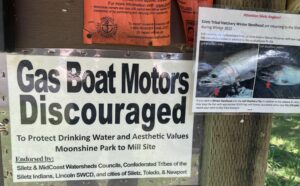
By QUINTON SMITH/Lincoln Chronicle
The Oregon Marine Board voted unanimously Thursday to accept a petition to ban motorized boats on much of the Siletz River and proceed to rulemaking – but making it clear it’s only considering the idea and first wants to see if there’s a compromise between interest groups.
The board was responding to a request by the Confederated Tribe of Siletz Indians to ban boat motors above Jack Morgan Park, which is 26 miles from the river’s mouth.
Based on more than 120 comments submitted before Thursday’s meeting and in-person testimony from eight others including four tribal officials, board members acknowledged they were wading into contentious waters.

The agency banned “jet pump” motors above Jack Morgan Park in 1987 but rejected requests to prohibit motors upriver in 2001, 2008 and 2013.
“There’s a long history of conflict; it’s time for the marine board to look at the issue,” said board member Steve Lambert, Jackson County’s parks director.
The motor ban request surfaced those competing interests – most all during the busy fall Chinook and winter steelhead fishing seasons – between river guides, recreational fishermen, riverside residents and the tribe.
In its petition, the tribe pointed out that the river is located within its ancestral lands and original Coast/Siletz Reservation, and that its request “is in keeping with our mission to care for, protect, enhance and provide for the wise use of all the Tribe’s natural resources in a manner which will ensure that all generations to come will benefit from these resources.”
Alan Hanson, the agency’s policy and environmental program manager, told the board that proceeding to rulemaking meant staff would first gather representatives of various interest groups, see if they had suggestions and a potential compromise, and then try to develop rules. At that point – probably not until next January – the board could accept the proposed rules, reject the proposals or amend them, Hanson said.
Executive director Larry Warren said the process is the same as the board used to establish rules for the upper Rogue River.
“The best case scenario is that we emerge with language that everyone says ‘Yes’,” he said.
Warren also said because any proposed rules will come after fall or winter fishing, it will be helpful for the agency and others to observe any river conflicts firsthand.
Board member Craig Withee of Bend said he hoped the agency could enlist the help of Oregon Department of Fish & Wildlife biologists to address concerns that boats with motors are disturbing fish habitat and spawning grounds, as proponents of the ban contend.
The ODF&W, which has no control over river use but has longstanding salmon and steelhead programs on the Siletz, has not weighed in on the issue.
Many of Oregon’s coastal streams, especially those in the heavily fished northwest part of the state have some limits on boat motors or type of motors. The marine board has prohibited all motors on the Nestucca River, for example, but allows quieter, less powerful electric motors only on upper portions of the Trask, Wilson and Kiltches rivers in the Tillamook area. Jet-pump motors are banned above tidewater on the Alsea River, but otherwise motors are allowed there — but little used because of the size of the stream.

Testimony to board
Two members of the Siletz tribal council and two staff spoke Thursday about why the board should ban motors, as did three people who said they live along the river.
Testifying against was Scott Amerman of Monmouth, a fishing guide and head of the Siletz Anglers Association. More than half of comments submitted to the board online opposed the ban or suggested alternatives.

Amerman said his group tries to improve access to the river, works with the ODFW and tribe to improve Chinook and steelhead runs, and asked for the board to “give the community the opportunity to fix this.”
“The last time we were before the marine board we fought each other,” he said, saying he hoped his group could work with the tribe to see if there was common ground.
“Let’s try to work together,” Amerman said.
Tribal council members, Bud Lane, and his son, Buddy Lane, natural resources director Angela Sondenaa and chief executive officer Kurtis Barker all testified that the tribe’s intent was to protect the river, its fish and the environment.
Buddy Lane said increased fishing pressure enabled by boats being able to run up and down the river was affecting more aquatic life than just salmon and steelhead. He said tribal members were advocating “for beings not able to speak for themselves.”
“This is also where our drinking water comes from,” Buddy Lane said. “We need to do everything we can to protect its being.”
Sondenaa said the motor ban petition was the fourth to come before the board in 24 years and the current request is designed to lessen “an over-exploitation of the fishery using new technology.”
“We want everyone to share the river,” she said, “but what we want to do is put the needs of the river first.”


